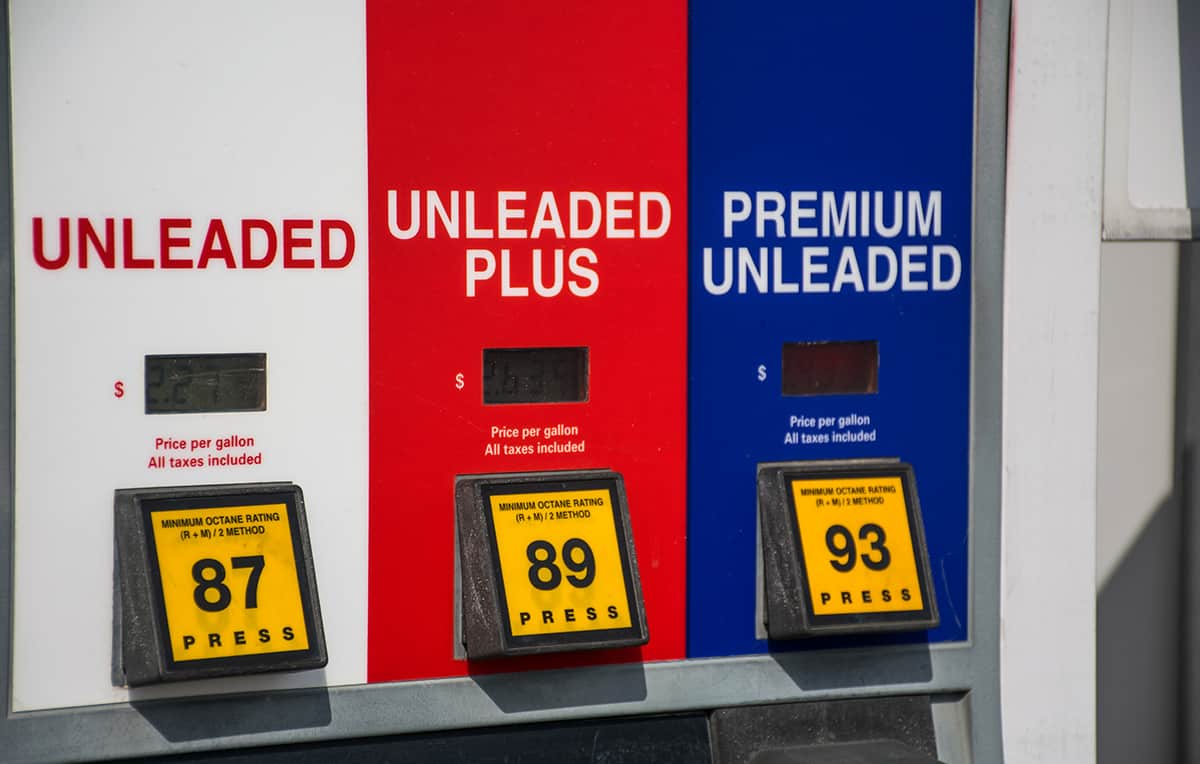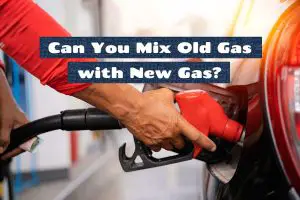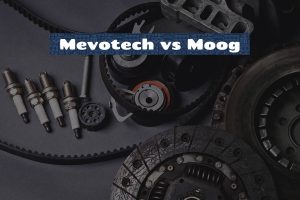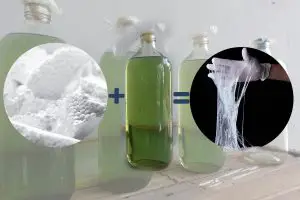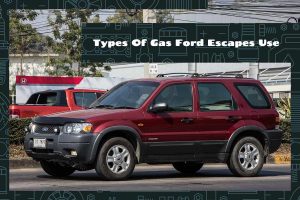When you pull up to the gas pump, you should be able to fill your car with any kind of gas since gas is gas, right? Well, this isn’t exactly the case. In fact, using the wrong type of gas can lead to disastrous effects, which is why you should understand the various types of gasoline for cars.
In general, there are 5 types of gasoline for cars:
- Regular unleaded
- Mid-grade gasoline
- Premium gasoline
- Ethanol-blended gasoline
- Diesel fuel
In this guide, I’ll explain in greater detail what these gasoline types are, how to tell what type of gas your car uses, and what can happen when you use the wrong type of gas.
Types of Gasoline for Your Car
Pull up to any gas station, and you’ll undoubtedly find numerous nozzles with strange writings on them. Here, I’ll help you decipher some of that technical jargon by explaining what the most common types of car gas are.
1. Regular unleaded
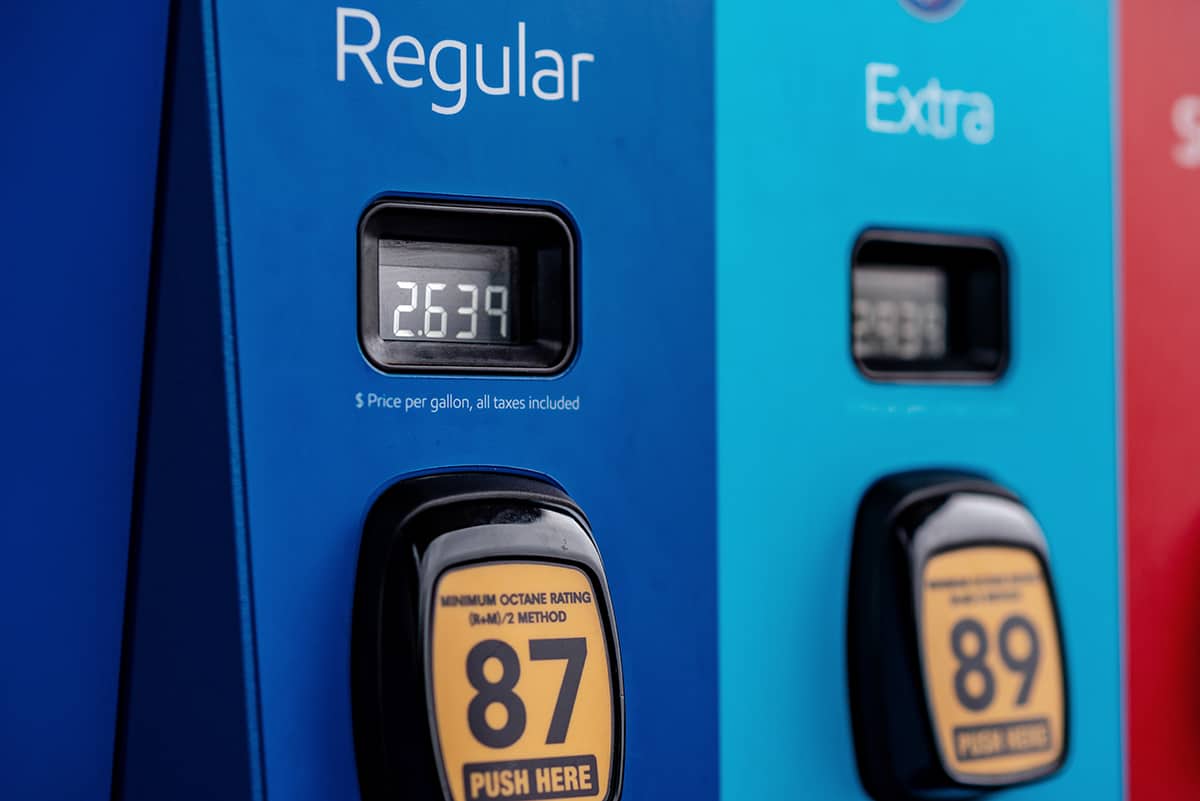
Regular unleaded gasoline is a type of gasoline that is commonly used in most vehicles that run on gasoline. It typically has an octane rating of 87 and does not contain any additives, such as detergents or performance enhancers.
This type of gasoline is the most commonly used type of gasoline and is suitable for most vehicles that do not require a higher octane rating or specialized fuel. It is typically the least expensive type of gasoline available at gas stations.
2. Mid-grade gasoline
Mid-grade gasoline, also known as Plus gasoline, is a type of gasoline that has a higher octane rating than regular unleaded gasoline, typically around 89. It is a blend of regular unleaded gasoline and premium gasoline, and it contains some additives, such as detergents, that can help clean the engine and improve performance.
Some vehicles call for an octane rating higher than regular unleaded gasoline, but not as high as premium gasoline, and this is where mid-grade gasoline comes in. Vehicles with such high-performance engines benefit from using mid-grade gasoline, which reduces the likelihood of knocking and increases mileage.
3. Premium gasoline
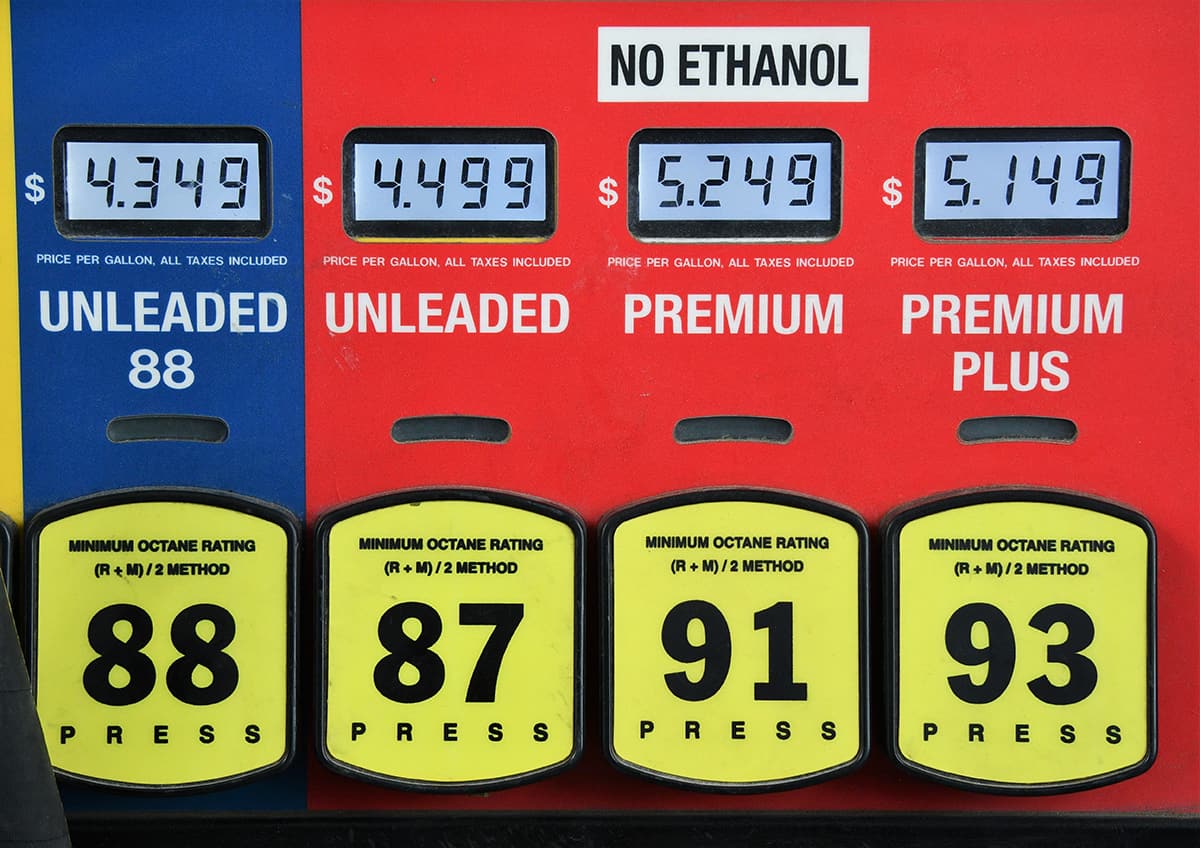
Premium gasoline is a type of gasoline that has a higher octane rating than regular unleaded gasoline and mid-grade gasoline, typically around 91 to 93. It is a more refined gasoline that contains a higher percentage of detergents and performance-enhancing additives, such as octane boosters and fuel system cleaners, to help keep the engine clean and improve performance.
High-performance sports cars, luxury vehicles, and some older or high-mileage vehicles benefit from using premium gasoline due to its higher octane rating. If you want to keep your engine from knocking, get better gas mileage, speed up your car, and have a more enjoyable driving experience overall, then you should use premium gasoline in your vehicle.
4. Ethanol-blended gasoline
Ethanol-blended gasoline is a type of gasoline that contains a blend of gasoline and ethanol, a renewable fuel made from crops such as corn, sugarcane, and other grains. In most countries, including the United States, the ethanol content in this type of gas gasoline is typically limited to 10% ethanol and 90% gasoline, hence its E10 moniker.
The addition of ethanol to gasoline has several benefits, including reducing greenhouse gas emissions and supporting domestic agriculture. Ethanol can also increase the octane rating of gasoline, which can improve engine performance and efficiency.
5. Diesel fuel
Diesel fuel is a type of fuel that is used to power diesel engines, which are commonly found in trucks, buses, trains, boats, and some passenger cars. Diesel fuel is a heavier and more viscous fuel than gasoline, and it is made from crude oil through a refining process.
There are a number of key distinctions between diesel and gasoline. First, it provides more usable energy per fuel unit than gasoline does. Second, unlike gasoline engines, diesel engines use compression to ignite the fuel rather than a spark. Due to their compression ignition process, diesel engines are typically more efficient than gasoline engines.
Diesel fuel is also available in several different grades, which are differentiated by their cetane rating. Cetane is a measure of the fuel’s ignition quality, similar to the octane rating for gasoline. Higher cetane ratings mean the fuel will ignite more easily and burn more cleanly, resulting in better engine performance and fuel efficiency.
What Is Octane?
Octane is a measure of a fuel’s ability to resist “knocking” or detonation in the engine, which can cause engine damage and reduce performance. Knocking occurs when the air-fuel mixture in the engine ignites prematurely before the spark plug fires, causing a pressure wave that can damage engine components.
You will sometimes see gas pumps a certain number of octanes. Octane ratings are typically expressed as a number that represents the percentage of octane in the fuel compared to the percentage of heptane, a hydrocarbon that is more prone to knocking. For example, a fuel with an octane rating of 87 has the same knocking resistance as a mixture of 87% octane and 13% heptane. The higher the octane rating of fuel, the more resistant it is to knocking.
In the United States, the most common octane ratings for gasoline are:
- Regular unleaded gasoline: 87 octanes
- Mid-grade gasoline: 89 octanes
- Premium gasoline: 91 to 93 octanes
How to Know What Type of Gasoline for Your Car?
Knowing what type of gasoline to use in your car is important to ensure optimal engine performance, fuel efficiency, and longevity. Here are some steps to help you determine the appropriate type of gasoline for your car:
- Check the owner’s manual: Your vehicle’s owner’s manual will specify the recommended octane rating for the gasoline to use in your car. It will also provide information about the type of gasoline, such as regular unleaded, mid-grade, or premium.
- Look for the fuel door label: Many vehicles have a label on the inside of the fuel door that specifies the type of gasoline to use. This label will usually indicate the minimum octane rating and the type of gasoline to use.
- Consult a mechanic: If you’re not sure what type of gasoline to use in your car or if you’re experiencing engine problems, it’s a good idea to consult with a qualified mechanic. They can help you determine the appropriate type of gasoline for your vehicle and diagnose any engine problems.
Can You Use a Lower/Higher Octane?
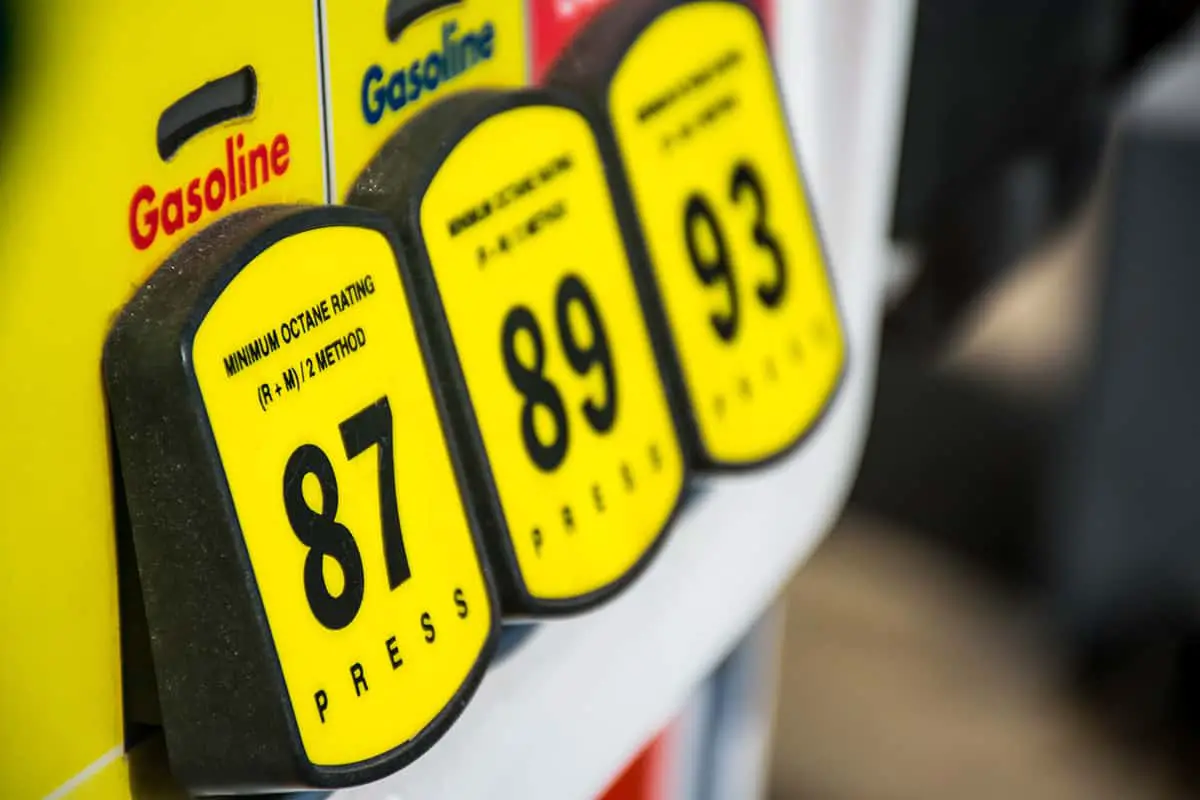
Using a lower or higher octane gasoline type than recommended can have negative effects on engine performance and fuel efficiency. Here’s what can happen:
Lower octane
Engine knocking or pinging can be caused by using regular unleaded gasoline in a vehicle that needs premium gasoline. When the air-fuel mixture in an engine ignites too quickly, a pressure wave is created that can cause damage to the engine. Furthermore, engine power and fuel efficiency can suffer if the recommended octane level of gasoline is not adhered to.
Higher octane
It’s possible that switching to higher-octane gasoline, like premium gasoline, won’t affect your car’s performance or fuel economy if it’s designed to run on regular unleaded gasoline. Higher octane fuel costs more, but it doesn’t improve performance. Higher octane gasoline than is recommended can have a negative impact on engine performance and fuel economy.
What Happens When You Use the Wrong Type of Gasoline
Here’s what can happen when you try to use the incorrect type of gasoline for your car:
1. Engine damage
This occurs when fuel ignites in the engine before it is ready, creating a pressure wave that can damage moving parts like the pistons, connecting rods, and bearings. Long-term exposure to such conditions can cause irreversible engine damage, necessitating expensive repairs or even total engine failure.
Putting diesel in a gas tank can cause serious damage to the engine and fuel system of a gasoline-powered car. Diesel fuel is denser and has a different chemical composition than gasoline, which means that it cannot be ignited by a spark plug. When diesel is added to a gas tank, it can cause a number of problems, such as a clogged fuel system.
2. Reduced fuel efficiency
When operating on regular unleaded gasoline instead of the premium fuel as recommended by the manufacturer, a car’s engine may not get as far on a single tank of gas. This is because it’s possible that the engine won’t be able to get as much power out of the fuel, making it burn more quickly and with less efficiency.
3. Increased emissions
The engine may knock or ping if you use gas with a lower octane rating than recommended, which can result in improper fuel combustion. Air pollution and environmental damage may result from increased emissions of pollutants like carbon monoxide, nitrogen oxides, and hydrocarbons.
4. Increased maintenance costs
If you use gas with a lower octane rating than recommended, your engine may knock or ping, which can cause expensive long-term damage. If the engine fails as a result, the repairs will be very expensive. Using the incorrect fuel can lead to a number of additional issues, including a decrease in power and efficiency, an increase in emissions, and accelerated wear and tear on engine parts.
